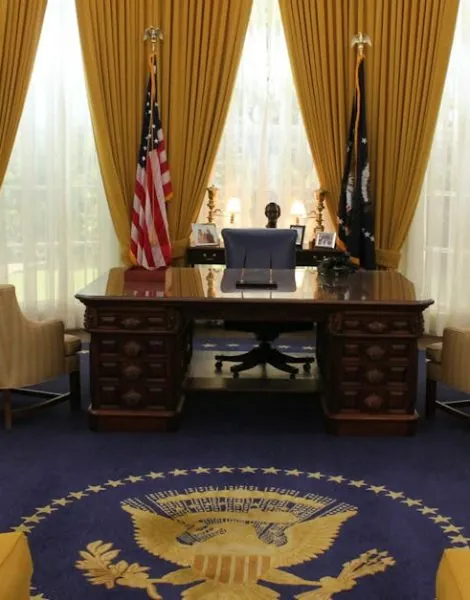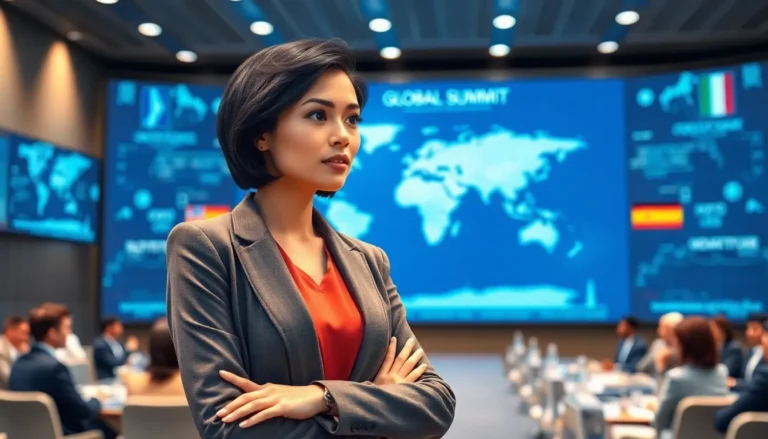In a world where borders blur and alliances shift faster than a cat meme goes viral, regional diplomacy pulse has never been more crucial. It’s the heartbeat of international relations, where nations navigate the delicate dance of cooperation and competition. Think of it as a diplomatic Tinder—swiping left on conflicts while swiping right on collaboration.
Table of Contents
ToggleUnderstanding Regional Diplomacy Pulse
Regional diplomacy focuses on interactions among neighboring countries. It’s crucial for maintaining stability and fostering cooperation in complex geopolitical environments.
Definition and Importance
Regional diplomacy refers to the efforts and strategies nations employ to manage relations with nearby countries. This form of diplomacy shapes trade agreements, security pacts, and cultural exchanges. Several organizations, such as the African Union and ASEAN, exemplify the significance of regional frameworks in addressing common challenges. Effectiveness in regional diplomacy promotes peace, enhances economic development, and cultivates mutual understanding among states. Countries actively engage in regional diplomacy to preempt conflicts and build coalitions on global issues.
Key Concepts of Regional Diplomacy
Several key concepts underpin the effectiveness of regional diplomacy. Multilateralism emphasizes cooperation among multiple nations to address issues collaboratively. Realpolitik highlights the pragmatic aspects, wherein nations prioritize national interests and strategic advantages. Trust-building mechanisms enhance dialogue, allowing countries to engage constructively despite historical tensions. Conflict resolution techniques, such as mediation and negotiation, play vital roles in de-escalating disputes. Lastly, soft power, which involves cultural influence and persuasion, enhances a nation’s ability to foster positive relationships in the region.
Current Trends in Regional Diplomacy
Regional diplomacy evolves dynamically, responding to various factors and influences across different areas.
Major Regional Actors
Nations like China, the United States, and Russia play significant roles in regional arenas. Each state contributes distinct resources, pushing forward initiatives tailored to their interests. Regional organizations such as the African Union and ASEAN facilitate cooperation by fostering dialogue among member countries. Their frameworks encourage collective responses to security and economic challenges. Small states also influence discussions, often shaping regional agendas through alliances and multilateral partnerships. Each actor’s move impacts stability, highlighting their interdependence in the larger geopolitical context.
Influencing Factors
Economic conditions often dictate the priorities of regional diplomacy. Trade agreements can stabilize relationships among countries while improving economic prospects. Moreover, historic ties and grievances affect diplomatic interactions and negotiations. Cultural exchanges also play crucial roles in developing mutual respect and understanding. Security concerns prompt nations to collaborate on defense strategies, addressing transnational issues like terrorism and climate change. Technological advancements enhance communication, allowing for more effective dialogue among states. Each of these factors contributes to shaping the current landscape of regional diplomacy.
Case Studies in Regional Diplomacy
Regional diplomacy thrives through various successful initiatives that demonstrate the power of collaboration. The African Union’s efforts in mediating conflicts in South Sudan highlight the effectiveness of regional leadership. ASEAN’s commitment to economic integration showcases how countries in Southeast Asia can enhance trade and foster stability through partnerships. The European Union’s approach to collective security illustrates the benefits of shared policies among member states, promoting peace and prosperity across borders. Each of these initiatives underscores how strategic cooperation leads to tangible improvements in regional stability and economic development.
Challenges frequently arise in regional diplomacy that can hinder progress. Political instability often strains relationships among neighboring countries, complicating collaborative efforts. Disparities in economic development create tension, with wealthier nations sometimes prioritizing their interests over regional harmony. Security threats, including terrorism and territorial disputes, can divert attention from diplomatic initiatives. Nationalistic sentiments may also impede dialogue, as leaders focus on domestic agendas rather than regional partnerships. Addressing these challenges is vital for advancing the objectives of regional diplomacy and achieving lasting peace.
Future Outlook for Regional Diplomacy Pulse
Regional diplomacy continues evolving, adapting to shifting global dynamics. The future suggests a heightened emphasis on collaboration among neighboring nations.
Predictions and Potential Developments
Anticipated developments include increased multilateral negotiations aimed at addressing shared challenges. Nations may prioritize sustainability and climate action within regional frameworks. Enhanced digital diplomacy stands to play a pivotal role in facilitating communication between countries. Additionally, smaller nations could emerge as influential players, leveraging alliances to amplify their voices. Geopolitical tensions may prompt innovative conflict resolution strategies as nations seek stability in their regions. Collective efforts toward economic recovery after global disruptions may drive deeper engagement among states.
Recommendations for Strengthening Diplomacy
Strengthening regional diplomacy requires fostering trust among countries. Engaging in frequent dialogue can build relationships and enhance cooperation. Establishing joint initiatives on critical issues will promote collaboration and shared benefits. Cultural exchanges ignite mutual understanding, making them essential tools in diplomacy. Promoting inclusive participation ensures that smaller states have a platform for their perspectives. Following these approaches will bolster regional frameworks, enhancing their effectiveness in addressing complex geopolitical challenges.
Regional diplomacy plays a pivotal role in navigating the complexities of today’s geopolitical landscape. As nations increasingly face shared challenges, the importance of collaboration and effective communication cannot be overstated. By fostering trust and promoting inclusive participation, countries can enhance their diplomatic efforts and build stronger alliances.
The evolution of regional diplomacy will likely continue to adapt to emerging trends and technologies. With a focus on sustainability and innovative conflict resolution, nations have the opportunity to create a more stable and prosperous future. Ultimately, the success of regional diplomacy hinges on the commitment of all states to engage constructively, ensuring a collaborative approach to addressing pressing global issues.









